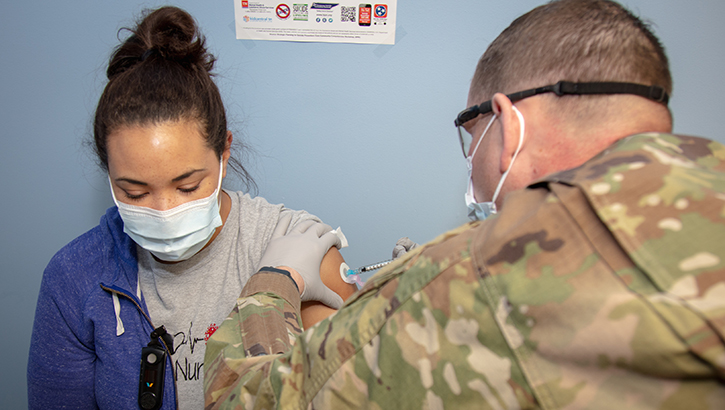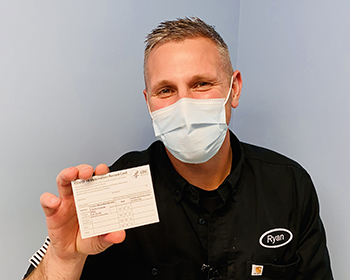BACH healthcare workers and first responders vaccinated for COVID-19
 Army Sgt. 1st Class Daniel Wood, who supports Blanchfield Army Community Hospital’s Soldier Medical Homes, administers the COVID-19 vaccine to Hillary Justmann, a registered nurse at BACH. Justmann is a frontline worker who provides medical care to COVID-19 patients admitted to the hospital’s Intensive Care Unit. She and other healthcare workers and first responders are among the first recipients of the first phase of COVID vaccines on Fort Campbell. Under the CDC guidelines, military and civilian healthcare workers and first responders directly involved in the hospital’s COVID response who have a high risk of exposure to the virus while carrying out their duties will be vaccinated first, keeping them in the fight. (Photo by David Gillespie, Blanchfield Army Community Hospital.)
Army Sgt. 1st Class Daniel Wood, who supports Blanchfield Army Community Hospital’s Soldier Medical Homes, administers the COVID-19 vaccine to Hillary Justmann, a registered nurse at BACH. Justmann is a frontline worker who provides medical care to COVID-19 patients admitted to the hospital’s Intensive Care Unit. She and other healthcare workers and first responders are among the first recipients of the first phase of COVID vaccines on Fort Campbell. Under the CDC guidelines, military and civilian healthcare workers and first responders directly involved in the hospital’s COVID response who have a high risk of exposure to the virus while carrying out their duties will be vaccinated first, keeping them in the fight. (Photo by David Gillespie, Blanchfield Army Community Hospital.)
Blanchfield Army Community Hospital nurses and medics begin administering Fort Campbell’s first shipment of COVID-19 vaccine to frontline military and civilian healthcare workers after receiving the vaccine.
BACH now joins other Defense Health Agency military treatment facilities that have received the vaccine, marking the start of a phased-in vaccination program to mitigate the spread of the virus.
“It is early in the COVID-19 vaccination program, so there is currently a limited supply of COVID-19 vaccine. Our vaccination distribution prioritization will be consistent with the Department of Defense and the data-driven CDC guidance for national prioritization,” said Army Col. Patrick Birchfield, BACH hospital commander.
Under the CDC guidelines, military and civilian healthcare workers and support personnel at BACH directly involved in the hospital’s COVID response and who are at the greatest risk of contracting the virus will be vaccinated first. Vaccines authorized for emergency use are offered on a voluntary basis.
“It is critically important we offer our team members and Fort Campbell first responders vaccinations first because we need them in the fight. If our healthcare workers and first responders contract the virus or miss work due to an exposure and are required to quarantine, it reduces the number of medical and emergency professionals we have to serve our community. This is especially difficult at a time when healthcare facilities are under greater demand,” said Birchfield.
Blanchfield registered nurse Ryan Diehl, who works in the emergency center was among the first frontline healthcare workers at the hospital to receive the vaccine.
“Being in the EC we may be exposed to COVID patients or COVID-like [symptoms] patients every single day,” said Diehl. “We all go home to our families and small children so if you don’t get [vaccinated] for yourself, get it done for your family. I’m proud to have it.”
 Registered nurse, Ryan Diehl, a frontline healthcare worker assigned to Blanchfield Army Community Hospital’s Emergency Center, shows his COVID-19 Vaccination Record Card before adding his personal information. (Photo by Maria Christina Yager.)
Registered nurse, Ryan Diehl, a frontline healthcare worker assigned to Blanchfield Army Community Hospital’s Emergency Center, shows his COVID-19 Vaccination Record Card before adding his personal information. (Photo by Maria Christina Yager.)
Hillary Justmann, a registered nurse who cares for COVID-19 patients in Blanchfield’s intensive care unit, said she gave it some thought before ultimately deciding to take the vaccine. “I was just slightly hesitant at first but after talking to some of our physicians and doing some reading I knew it was definitely something that I needed to do. So if you are unsure, do your research, talk to medical professionals, talk to other people who have gotten [vaccinated], but I would definitely recommend it.”
As manufacturing and distribution of the approved vaccines ramps up, Blanchfield, and other medical treatment facilities across the military health system will receive additional shipments from the DOD and continue to follow its phased in distribution plan to administer the COVID-19 vaccine to those who want it.
Exact dates and numbers for when the hospital will receive more shipments of the COVID-19 vaccine have not yet been determined. Soon, the hospital’s clinical services division will launch an automated telephone survey to beneficiaries enrolled at BACH with one or more high-risk factors in their medical record. The survey will help hospital officials determine how many high risk beneficiaries plan to take advantage of the vaccine.
“There are many details still being sorted out in this new process of distributing this vaccine but I’m confident that in the coming weeks and months we will see our capacity grow exponentially and we will share that information with our community,” said Birchfield.
The DOD announced it would continue to distribute vaccines in a phased-in format adding additional prioritized personnel. Ultimately, the plan is to make the vaccine available to any service member, retiree and family member, DOD civilian and certain contractors who volunteer to receive it.
In the meantime, Birchfield stressed the continued mitigation efforts which are critical to help reduce the current spike in many parts of the nation, including Tennessee which recently topped the nation with the most daily cases per 100,000 people.
“Continue to practice hand hygiene, wear a face mask or face covering when you are among people who live outside your household, continue with social distancing. We are not out of the woods yet and we must remain committed to preventing the spread of this disease that has caused so much death and suffering on our nation and the world.”
For the latest information concerning the hospital’s COVID-19 response effort, including vaccine distribution information follow BACH’s Facebook page.